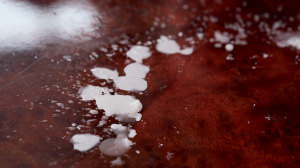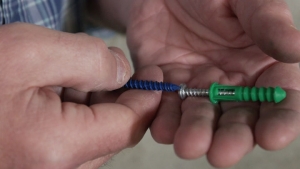How To Install Gutters In Your House
Learn how to install gutters correctly to protect your home from water damage
Learn how to install gutters correctly by measuring the slope of your eaves and adjusting the slope of the gutters accordingly for maximum efficiency.
Read More
gutter and downspouts
Using a line level attached to a string, figure out the slope of the eaves. All gutters must slope at least ¼ inch for every ten linear feet to provide proper drainage.

Measure and Mark for a Level Roof and for Elbows and Turns
For a roof that is level, strike a level reference line, then a second mark ¼ of an inch below the line to indicate the correct slope. If there are portions of the gutter which will have turns or elbows on each end, determine the length for the straight section by holding the elbows in place and marking their ends. Subtract ¼ inch to allow room for the seams that will be installed later.

Cut Gutter Sections to Size
Mark the gutter sections using a combination square to carry the line all the way around, then use heavy-duty tin snips to cut the piece to length

Mount the Gutters
Snap brackets into place six inches from each end of the gutter and then every 18 to 24 inches. Mount the gutters by driving a screw through each bracket and into the face-board on the eaves.

Preparing for the Downspout
Holding the gutter in place, mark the location for the downspout hole. Cut a square hole in the bottom of the gutter by first making a punch mark in each corner and then using a jigsaw. File the edges smooth.

Install Downspout Connector and End Cap
Apply silicone sealant to the lip of the downspout connector and place it into the cutout. Press into place then secure with short metal screws. Install an end cap into the last gutter section but slipping it onto the end and crimping the edges.

Attach Gutter to Eaves, Cut and Fit Downspout
Attach the gutters to the eaves by driving screws through each bracket and into the face-board of the eaves. Cut and fit the downspout pieces together, making sure that the tapered end is down.

Using Wooden Spacers for the Downspout
If necessary, cut wooden spacers from two by four lumber and attach aluminum mounting straps, using screws and fastening both to the post. Install and screw downspout pieces together. Fold the aluminum mounting straps around the downspout and secure with screws.

Connecting Gutter Sections
Connect the straight sections of the gutter to each other and the corner angles using a two-inch strip of aluminum called a “seamer”. It over laps the joints and fills in the ¼ inch gap left earlier. The joints are made watertight by applying a heavy bead of sealant on the inside.

Testing the Gutters
Let the sealer dry overnight, then take a garden hose and put it in the end away from the downspout and check to make sure the water is flowing toward and into the downspout and that it’s not leaking at the joints. If leaves are a problem, put up leaf guards all the way around.
Related Tips
Blog Articles
Have You Heard of Landscape Glue?
You love the rustic charm of a gravel walkway, but the constant scattering of stones across your lawn and patio can be a real headache. Whether it’s from pets, lawn mowers, or just foot traffic, it seems impossible to keep those stones in place. Sound familiar? Well, Brian shows us a simple DIY method using landscape glue to keep your gravel path looking pristine and, more importantly, in place.
How to Remove Candle Wax Drips: Two Effective Methods
Candles create a warm and inviting atmosphere, but those pesky wax drips can be a real headache. Luckily, Brian shows us a couple of effective methods to tackle this issue, and they involve two very different temperatures: hot and cold. Here, we'll explore two effective methods: one using cold and the other using heat.
Guide to Hanging on Masonry Walls
Ever wondered how to hang that picture frame or shelf on a brick or concrete wall? It can seem daunting, but with the right tools and techniques, it's a straightforward DIY project. This guide breaks down two common methods: using concrete screws and using anchors, making it easy for you to tackle your next hanging project.







